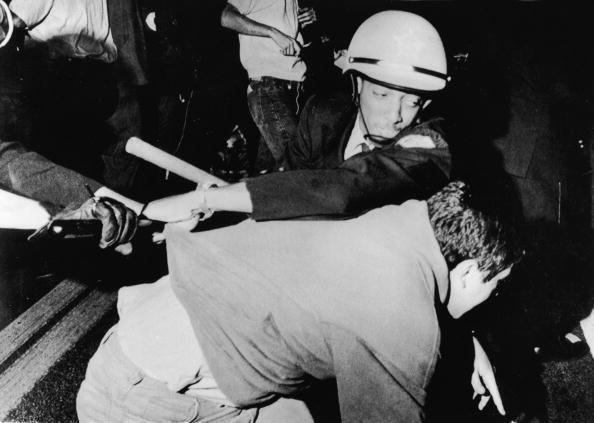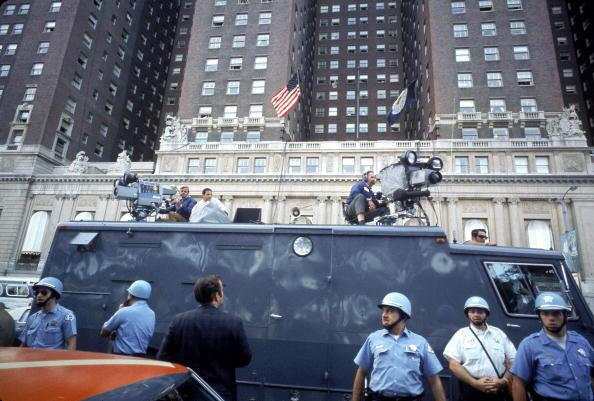It's primary day in Wisconsin, and neither GOP front-runner Donald Trump nor Democratic leader Hillary Clinton is expected to walk away with a win.
For Democrat Bernie Sanders, a victory in "Forward" state could give him a much-needed delegate boost.
For Republicans, however, a win by runner-up Ted Cruz will bring little clarity to the deeply-divided conservative party.
If Cruz emerges victorious, it would be significantly more difficult for Donald Trump to lock in enough delegates to claim the nomination before the party's July convention in Cleveland. That would mean a bare-knuckle battle for delegates, all taking place in view of TV cameras and thousands of reporters.
It's a journalist's dream, and a political party's nightmare: a contested convention.
Few in the political arena now have been around long enough to remember the last time either party saw campaigns carry into the convention. As a result, it's hard to predict just how a contested convention might look.
To gain a deeper understanding of the country's history with conventions, Take Two took a look back with Dan Schnur, director of the Jesse M. Unruh Institute of Politics at USC.
1968 Democratic Convention
Where: Chicago, Illinois
Candidates: Hubert Humphrey vs. Eugene McCarthy
Tasting notes: Riots, police crackdown, assassinations, political insiders
The Vietnam War was entering its third year when incumbent Democratic President Lyndon B. Johnson announced that he would not be running for another term. Days later, Massachusettes Senator and presidential hopeful Bobby Kennedy was shot and killed at the Ambassador Hotel. Johnson's vice president, Hubert Humphrey, was chosen as the establishment favorite. That didn't sit well with many at the convention, says Dan Schnur.
"At that point, the Democratic Party had been ripped apart," Schnur said. "Johnson's decision not to seek re-election ... Kennedy's assassination and Eugene McCarthy's insurgent candidacy fueled by very fervent opposition to the Vietnam War left the Democratic Party in tatters, from which it took several years and several election cycles to recover."
Chicago Mayor Richard Daley, an ardent member of the Democratic Party establishment, took it upon himself to ensure that Hubert Humphrey received the party's nomination, using the Chicago Police Department to crack down on dissenters outside the convention, and bully delegates on the floor. Schnur says footage of police officers beating protesters with clubs had a — predictably — negative impact on the image of the Democratic party.
"The divisiveness and the violence of 1968, followed by George McGovern's candidacy in 1972, really created an opportunity for the Republicans for the next — almost twenty years — to dominate politics at the presidential level," Schnur said. "Only Jimmy Carter's election — in the immediate aftermath of Watergate — was the only Democratic elected president in that period."


1976 Republican Convention
Where: Kansas City, Missouri
Candidates: Gerald Ford vs. Ronald Reagan
Tasting notes: Stirring orations, delegate wooing
The 1976 Republican Convention was considerably more civil than the Democratic contest years earlier. Ronald Reagan and Gerald Ford had both fared well in the primaries, but neither had a firm majority. Both candidates came to Kansas City hoping to persuade uncommitted delegates to give their support. After much cajoling, it became apparent that Gerald Ford was going to come out on top. Before departing, however, Ronald Reagan delivered an oration that arguably eclipsed Ford's acceptance speech.
https://www.youtube.com/watch?v=_eSmfldz_bA
Dan Schnur says Reagan's concession speech had the desired effect: the party was left intact, and he (Reagan) still came out a winner.
"For all practical purposes, Ronald Reagan's speech at the 1976 Republican Convention may as well have been his announcement speech for the 1980 election," Schnur said. "There was no question that when Reagan departed from the stage that night, that he was going to be the Republican nominee at some point in the future."
He adds that Ford lost that election — in part — because few voters were particularly excited for the candidate.
2016 Republican Convention
Where: Cleveland, Ohio
Candidates: TBA
Tasting notes: TBA
Looking to a possible contested or brokered convention this presidential election year, Schnur contends that the past offers few hints about which way candidates and delegates might turn.
"The examples we've been citing have come before social media, before the internet, before cable television," Schnur said. "I think what you can learn from those prior examples is what a party needs to do after a very public, bitter, divisive fight ... how a party rebuilds itself, how it reunites — or doesn't — going forward once the convention is concluded."
Press the blue play button to hear the interview, complete with clips from the conventions.
Featured songs:
"For What it's Worth," by Buffalo Springfield (1967)
"A Fifth of Beethoven," by Walter Murphy (1976)
CORRECTION: A previous version of this article stated that Sen. Bernie Sanders could receive a 96-point boost from Wisconsin. We regret the error.



